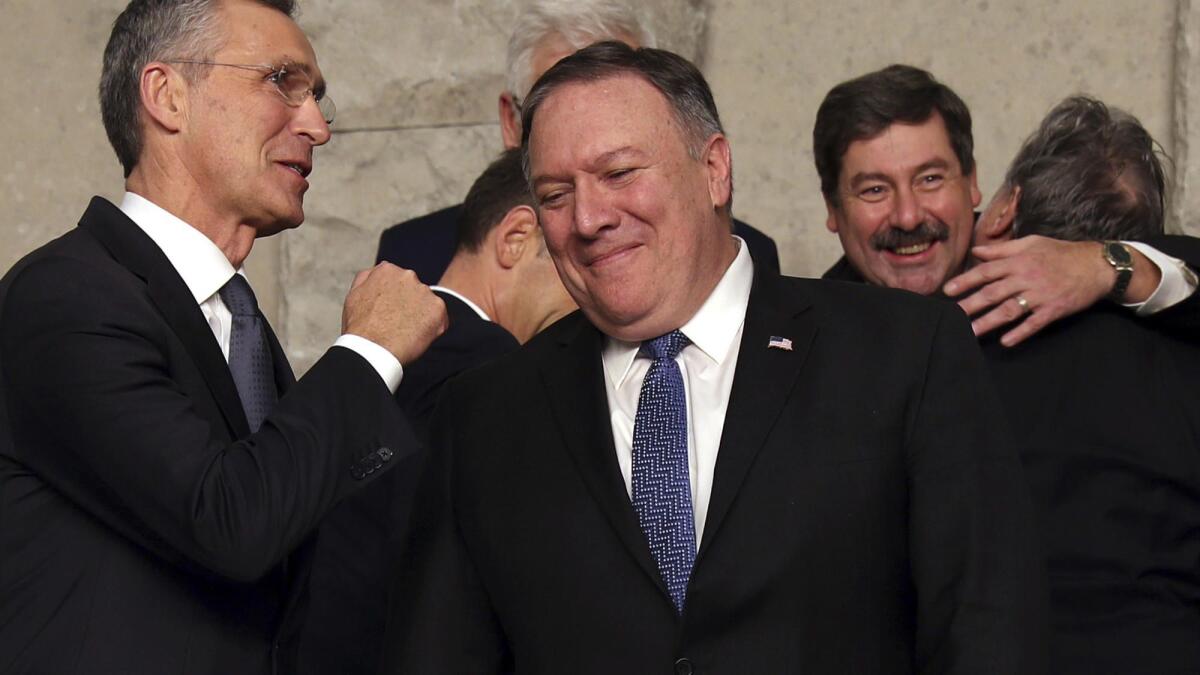Pompeo sets 60-day deadline to keep arms control pact with Russia

Secretary of State Michael R. Pompeo said Tuesday the United States will begin withdrawing from a landmark arms control treaty in 60 days unless Russia stops cheating, setting a hard deadline for the first time during a meeting at NATO headquarters in Brussels.
Some U.S. allies and critics in Congress have warned that President Trump, who first threatened to abandon the pact in October, would endanger Europe if he tears up the Intermediate-range Nuclear Forces Treaty, which was signed by the United States and Soviet Union in 1987 near the end of the Cold War.
But the White House got strong backing Tuesday from fellow members of the North Atlantic Treaty Organization, the 29-member military alliance originally set up in Europe to counter Soviet aggression.
In a statement, NATO said it was “up to Russia” to stop violating the INF treaty, which required the two superpowers to eliminate and permanently forswear all nuclear and conventional ground-launched ballistic and cruise missiles with ranges of 500 to 5,500 kilometers (about 300 miles to about 3,400 miles).
“Allies have emphasized that the situation whereby the United States and other parties fully abide by the Treaty and Russia does not, is not sustainable,” the NATO statement said.
The Reagan-era pact marked the first time Washington and Moscow agreed to reduce their nuclear arsenals, eliminate an entire category of nuclear weapons, and use extensive on-site inspections for verification, according to arms control experts.
As a result, the two nations destroyed nearly 2,700 missiles by the treaty’s implementation in mid-1991.
The U.S. began accusing Russia of violating the treaty in 2014 by building a ground-launched cruise missile that could fly farther than the allowed range, and has repeated the allegation every year since. Russia has denied violating the agreement.
Dan Coats, director of national intelligence, said last week that Russia has tested and deployed missiles capable of flying farther than 500 kilometers (about 300 miles) from both fixed and mobile launchers.
In recent months, Coats added, Russia has fielded “multiple battalions” of the missiles, posing “a direct conventional and nuclear threat against most of Europe and parts of Asia.”
In his comments Tuesday, Pompeo accused Russia of being in “material breach” of the treaty, and called on Moscow to “return to full and verifiable compliance” before the 60-day deadline expires.
“We either bury our head in the sand or we take common sense action in response to Russia’s flagrant disregard for the express terms of the INF Treaty,” Pompeo said.
“Russia’s actions gravely undermine American national security and that of our allies and partners,” he added. “It makes no sense for the United States to remain in a treaty that constrains our ability to respond to Russia’s violations.”
If the U.S. suspends participation in the INF treaty, it would still require six months to formally withdraw.
NATO leaders have sought ways to challenge the Kremlin after Russian military forces invaded Georgia in 2008, annexed Crimea from Ukraine in 2014, and seized three Ukrainian naval vessels and their crews last month.
Russia’s military role also has grown in Syria, helping President Bashar Assad retain his grip on power, and British authorities blamed Russian intelligence agents for the nerve-agent poisoning in England of a former Russian spy and his daughter in March.
European leaders had pressed Trump to delay withdrawing from the INF treaty until they could explain why to their domestic publics. Pomeo said the 60-day period gave the Europeans the breathing room they sought.
Pompeo’s warning to Russia drew a mixed reaction in Congress. Sen. Jim Inhofe (R-Okla.), chairman of the Senate Armed Services Committee, called it long overdue and the United States should “no longer tolerate Russian deception.”
Rep. Eliot Engel (D-N.Y.), ranking member of the House Committee on Foreign Affairs and likely its next chairman, said that despite Russia’s “egregious” violations, the U.S. should work with Europe to bring Moscow into compliance rather than withdraw unilaterally.
Pompeo’s warning on the INF pact followed a speech in which he questioned whether major international organizations, including the United Nations, International Monetary Fund, World Bank and African Union, remained relevant.
He said the United States is not abandoning America’s role as a global leader with Trump’s focus on an “America First” foreign policy.
Rather, he said, the administration is seeking solutions outside traditional multilateralism that give priority to the “nation-state” and to America’s interests, echoing the theme that Trump promoted at the U.N. General Assembly in September.
“Our mission is to reassert our sovereignty, reform the liberal international order, and we want our friends to help us and to exert their sovereignty as well,” Pompeo said.
“International bodies must help facilitate cooperation that bolsters the security and values of the free world, or they must be reformed or eliminated,” he added.
tracy.wilkinson@latimes.com
UPDATES:
2:30 p.m.: This article has been updated with staff reporting.
The article originally was published at 9:40 a.m.
More to Read
Start your day right
Sign up for Essential California for news, features and recommendations from the L.A. Times and beyond in your inbox six days a week.
You may occasionally receive promotional content from the Los Angeles Times.






